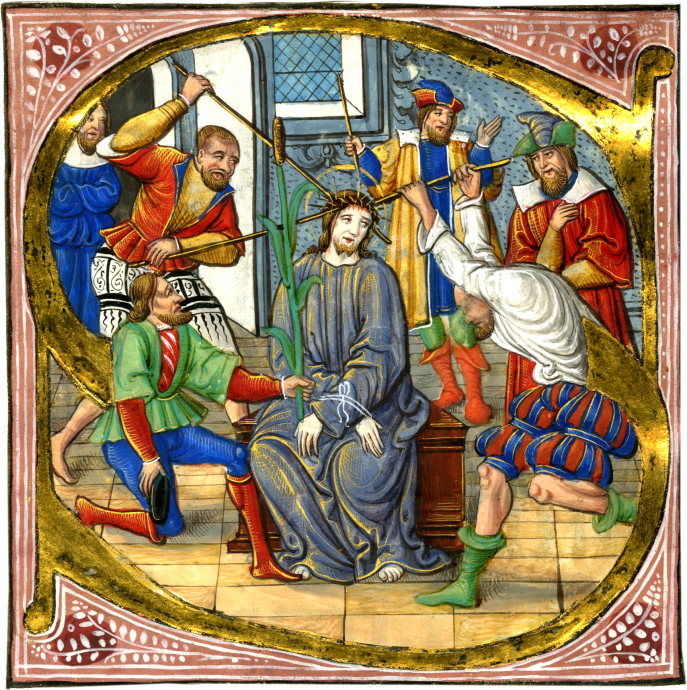


Guillaume Charmolue (Orléans?, active c. 1530-1540)
, c. 1530-1540Guillaume Charmolue (Orléans?, active c. 1530-1540)
Description
Guillaume Charmolue was a Celestine monk and artist about whom little is known but who has recently been pulled from obscurity in forthcoming research to be published by François Avril. Illuminated in the workshops of a Celestine monastery, the present miniature is related to the historiated initials painted in a series of liturgical manuscripts created between 1530 and 1540 for the Celestine houses of Sainte-Trinité, Marcoussis, near Paris, and Notre-Dame-des-Célestins, Ambert, near Orléans. Guillaume Charmolue is recorded as the illuminator of these manuscripts, including two Psalters, that are described in surviving letters from the seventeenth and eighteenth centuries.
Christ sits calmly in the center of an historiated initial "S." Hands bound and crossed in front of him, he endures with dignity the insults of the torturers, while a gentleman kneeling before him on the left offers a martyr's palm. The tormentor dressed in striped pantaloons on the right reminds us, as Michel Pastoureau has underscored, that to wear stripes was considered "bad" in the Middle Ages, signifying that the person was in some way transgressive. Prostitutes, the devil, hangmen, sorcerers, the insane, criminals, and jugglers wore stripes. The figure on the right, looking on with quiet pleasure, is surely Pilate who ordered Christ's scourging. The scene is described in all four Gospels (Mark 14:65; Luke 22:64; Mark 15:17-20; Matthew 27:28-29.).
The present cutting must come from an illuminated Psalter. The text on the verso, written on lines 26 mm. high, includes verses from Psalm 67: 29-31, as follows: " … operatus es in nobis./ [A templo tuo in Jerusa]lem,/ tibi offerent [reges munera. /Inc] repa feras arundi [nis;/ congregatio taur]orum in vaccis [populorum:/ ut exclu] dant eos qui pro [bati sunt argento.]/ Dissipa gentes quæ bella volunt …" (Command thy strength, O God: confirm, O God, what thou hast wrought in us. From thy temple in Jerusalem, kings shall offer presents to thee. Rebuke the wild beasts of the reeds, the congregation of bulls with the kine of the people; who seek to exclude them who are tried with silver. Scatter thou the nations that delight in wars). Could the miniature introduce the following Psalm 68, which begins "Salvum me fac" (Save me O Lord)?
Literature
On French manuscript illumination in this period see F. Avril and N. Reynaud, Les manuscripts à peinture en France, Paris,1993, pp. 278-281.